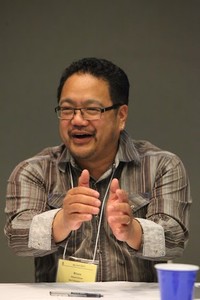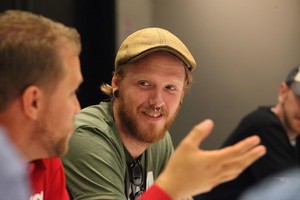Former General Assembly Moderator Bruce Reyes-Chow remembers the way it was at the church where he was founding pastor, Mission Bay Community Church in San Francisco: most people didn’t join the church until they were being ordained as a ruling elder.
“There was some import to it, not ‘Whose turn is it this time?’” Reyes-Chow said Aug. 2 during the National Elders Conference workshop “Young Adult Ruling Elders: Serving as Congregation Leaders” at Big Tent.
“Eldership is a spiritual leadership place in the congregation,” he said. “We don’t want you to be an elder unless you’re called.”
Big Tent, Aug. 1-3, is a celebration of Presbyterian Church (U.S.A.) mission and ministry organized around the theme “Putting God’s First Things First.” It’s composed of 10 national Presbyterian conferences, more than 160 workshops and special events to mark the 30th anniversary of the formation of the PC(USA) and the 25th anniversary of the opening of the Presbyterian Center here.
He knew he’d helped create a valued culture of leadership — one in which the average age among session members was 26 — when an elder named Ryan stopped in for a session meeting one night, grabbed a taco and a beer and said, “I’m so glad I’m at session.”
“He felt his leadership was important,” Reyes-Chow said. “We created a culture that allowed people to do good work and to be challenged.”

Former General Assembly Moderator Bruce Reyes-Chow leads a young elders panel at the National Elders Conference at Big Tent. —Danny Bolin
Young ruling elders from around the country chimed in during Friday morning’s workshop.
Dylan Rooke, building manager for Hot Metal Bridge in Pittsburgh, is the son of missionaries who said he grew disillusioned with the church. “I left thinking the church is full of (excrement), but there’s something to this Jesus guy,” he said. “We were doing Bible study in the basement of a tattoo shop, but we found strength in Presbyterian structure. Now our church even has committees.”
Karl Heimbuck, a ruling elder and Young Adult Volunteer planning to enter Columbia Theological Seminary in the fall, helped establish a ministry for fellow college students at a church across the street from the college. The group elected to remove the pews from a little-used chapel, transforming it into a worship and meal space. During Holy Week students were moved by sharing a meal together and washing each other’s feet.
One student new to the program told him, “I can’t believe that I didn’t know all this was going on.”
Invariably, church members noticed the missing pews. Some expressed reservations.
“Are we concerned about the pews,” Heimbuck asked them, “or with what this girl said?”

